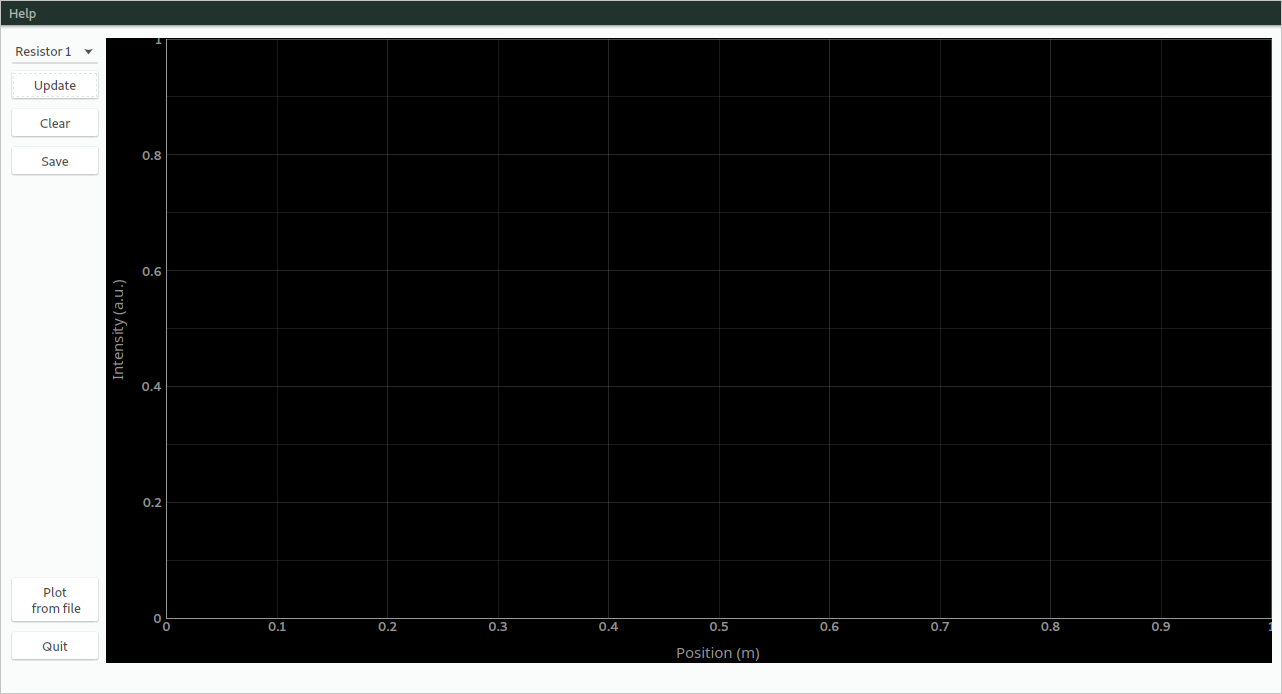The English version follows
Ce programme a pour but de faire l'acquisition de données de l'intensité lumineuse en fonction de la position dans une expérience d'interférence et de diffraction.
L'acquisition passe par une carte Arduino avec le script radhiohm.ino. Le calcul de la position se fait à partir de la mesure de la différence de potentiel aux bornes d'une résistance variable. Un détecteur de lumière est fixé à cette résistance. Dans le graphique, la position est représentée sur l'axe des x, et l'intensité lumineuse (en fait la différence de potentiel aux bornes du détecteur) sur l'axe des y.
Le programme est disponible pour Linux, MacOS et Windows. Il s'agit en même temps d'un projet personnel d'apprentissage de programmation. Si vous trouvez des erreurs, sentez-vous bien à l'aise de les souligner à partir de l'onglet "Issues" sur GitHub.
Le fichier utilisé pour démarrer le programme est radiohm.py.
Afin d'utiliser ce programme, vous aurez besoin des logiciels suivants :
- Python 3
Si vous utilisez Linux, Python sera généralement déjà installé. Si ce n'est pas déjà fait, vous pouvez installer Python 3 à partir des dépôts de logiciels de votre distribution.
Que vous utilisiez Linux, MacOS ou Windows, vous pouvez aussi installer Python à partir du site officiel. Sélectionnez ensuite le paquet correspondant à votre système d'exploitation.
Vous aurez aussi besoin des modules Python suivants :
- Numpy
- Matplotlib
- PyQt5
- pyqtgraph
- pyserial
Si vous utilisez Linux, il est fort probable qu'ils se trouvent dans les dépôts logiciels de votre distribution.
Pour tous les systèmes d'exploitation supportés, à partir de la version 3.4, Python inclus de plus pip, un gestionnaire de paquet qui permet d'installer des modules pour Python. Pour vérifer la version de Python installée sur votre système, ouvrez un terminal (Linux, MacOS) ou une invite de commande (Windows) et tappez :
python --version
Si le numéro de version affiché à l'écran commence par 2, dans tout ce qui suit, utilisez python3 au lieu de python, et pip3 au lieu de pip.
Vous pouvez vous servir de pip pour installer les divers modules nécessaires. Par exemple, pour installer Numpy, entrez dans un terminal (ou invite de commande) :
pip install numpy
Une fois ces modules installés, dans le terminal sous Linux et MacOS ou l'invite de commande sous Windows, entrez :
python radiohm.py
Sous Windows, vous pouvez aussi double-cliquer sur le fichier radiohm.py.
Le programme est distribué sous la licence GNU GPLv3. Pour le texte complet, référez-vous au fichier LICENSE.
La version courte de cette licence est que vous êtes libre d'utiliser ce logiciel, d'en modifier le code source, ainsi que de le redistribuer, que ce soit sous sa version originale ou modifiée. Cependant, vous devez donner ces mêmes droits aux personnes qui utiliseront votre logiciel redistribué.
Le code source est disponible sur GitHub.
Ce logiciel utilise des bibliothèques de Qt sous la licence LGPLv3, ainsi que de Python, Numpy et Matplotlib.
This software serves to gather data of the intensity of the light as a function of position in a diffraction and interference experiment.
The data is gathered through an Arduino board with the radhiohm.ino script on it. The position is computed from the voltage of a variable resistor. A light detector is fixed on the resistor. On the graph, the position is represented on the x axis, while the intensity of the light (in fact the voltage of the detector) is represented on the y axis.
This program is available for Linux, MacOS and Windows. It is also a personal learning project. Please report any errors you find using the "Issues" tab on GitHub.
The file used to start the program is radiohm.py.
You will need some software to use this program, namely:
- Python 3
If you are using Linux, Python will generally already be installed. If not, you can install it from your distribution's repositories.
You can also install Python from the official website. Once there, select the appropriate package for your operating system.
You will also need the following Python modules:
- Numpy
- Matplotlib
- PyQt5
- pyqtgraph
- pyserial
On Linux, you will most likely find these modules in your distribution's repositories.
On all supported operating systems, starting with version 3.4, Python includes pip, a package manager for Python which can be used to install the necessary modules. To check the version of Python that is installed on your system, open a terminal (Linux, MacOS) or a command prompt (Windows) and type in:
python --version
If the version number displayed on screen begins with 2, replace python with python3 and pip with pip3 in every command that follows.
You can then use pip to install the necessary modules. For instance, to install Numpy on Linux, acquire administrator rights and then type in a terminal:
python pip install numpy
On Windows, administrator rights are not required, and the command is instead:
pip install numpy
Once these are installed, open a terminal on Linux or MacOS (or command prompt on Windows) and enter:
python radiohm.py
Moreover, on Windows, you can simply double-click on the radiohm.py file.
This program is distributed under the GNU GPLv3 licence. The details of this license can be found in the LICENSE file.
The short version is that you are free to use this software, to modify its source code, and to redistribute it in either its original or modified form. However, you have to give those same rights to the users of the redistributed software.
The source code is available on GitHub.
This software uses libraries from Qt under the LGPLv3, Python, Numpy and Matplotlib.


